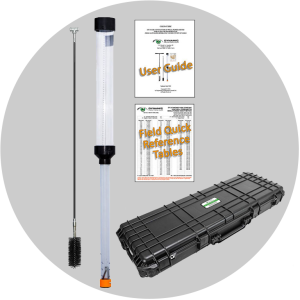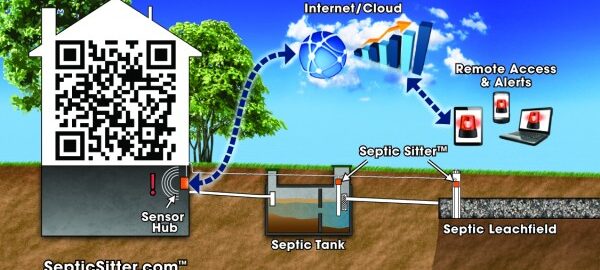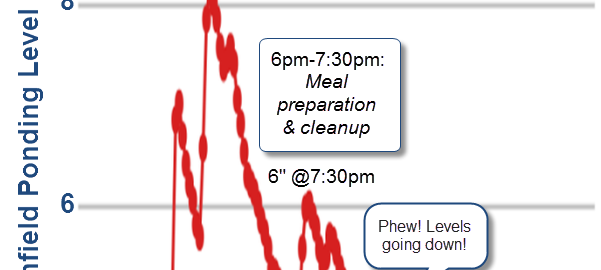The ETC Pask Permeameter is a constant head well permeameter designed and manufactured by Dynamic Monitors. It can be used to determine the field-saturated hydraulic conductivity (Kfs) or the T time or percolation time (perc time) of soil or other porous media. Although the instrument has some limitations compared to more expensive alternatives such as the Guelph Permeameter, the Amoozemeter, and the Johnson Permeameter, most users find it suitable for their routine testing requirements at a fraction of the cost of other options.
Several customers have found that the unique design and lightweight construction of our ETC Pask Permeameter saves time in the field, and allows the completion of more permeability tests in less time compared to other constant head permeameters. It is definitely much faster than the percolation test.
Table comparing ETC Pask Permeameter to the Guelph Permeameter
The table below contrasts the ETC Pask Permeameter with the Guelph Permeameter on twenty different points of comparison. Please feel free to contact us if you have any questions!
Point of Comparison |
ETC Pask Permeameter |
Guelph Permeameter |
Used to determine: |
Field saturated hydraulic conductivity (Kfs) of in situ soil, also prepared fill materials and constructed soil liners. | Field saturated hydraulic conductivity (Kfs) of in situ soil, also prepared fill materials and constructed soil liners. |
Applicable permeability range: |
4.0 x 10-9 m/sec to 5.0 x 10-4 m/sec | 10-7 m/sec to 10-4 m/sec |
Applicable soil textures/types: |
Virtually any soil type – USDA/CSSC: clay to sand. USCS: Sand, silty sand, silt and clay. | Virtually any soil type – USDA/CSSC: clay to sand. USCS: Sand, silty sand, silt and clay. |
Time to set-up, fill and tear down Permeameter: |
Approx. 2 min – See video below. | Approx. 7 min – See video below. |
Time to conduct a test: |
Most tests on medium permeability soils take 20-45 min. Tests on very slowly permeable soils (e.g. clays) can take several hours. Consider using the ETC Slow Soil Permeameter for such soils. | Most tests on medium permeability soils take 20-45 min. Tests on very slowly permeable soils (clays) can take several hours. |
Guidance information on relationship to percolation tests? |
Yes. A new relationship correlating Kfs to Perc Time is provided based on the 2015 peer-reviewed paper by Reynolds et al. Formulas and a quick conversion table are included in the guide. | The user guide states: “Approximate relationship is available upon request”. |
Are quick field calculation tables provided? |
Yes, for the four (4) major soil capillarity category types (α* values) described by Reynolds (2008). | No. |
Math skills required to conduct tests and obtain Kfs results: |
Basic. With our Field Quick Reference Tables, you can determine Kfs in 10 seconds or less. | Above average (College or University). Must calculate Kfs from formulas, or using the Guelph Permeameter Calculator spreadsheet. |
Method for testing imported fill materials used in septic beds? |
Guidance is provided based on the method recommended in the CAN CSA B65-12 standard. | No method or guidance was provided. |
Volume of water required: |
Approx: 2 Litres (0.53 gals) per test | Approx: 2.5 Litres (0.66 gals) per test |
Theory and calculations based on: |
Constant head well permeameter (CHWP) method as described by: Reynolds et al (2015), Reynolds (2008), Elrick & Reynolds (1985, 1992), Lilly (1991, 1994, 2000) | Constant head well permeameter (CHWP) method as described by: Reynolds (2008), Elrick & Reynolds (1985, 1992), Zhang & Parkin (1998) |
Single or double ponded head method? |
Single head method. | Uses single or double-head methods. |
Maximum operating/testing depth below soil surface: |
60cm (24″) extended to 1.2m (48″) with a hand shovel. If testing to greater depths is required, remove excess soil with an excavating machine. Custom depth models are provided on request. | 75cm (30 inches). If testing to a greater depth is required, remove excess soil or purchase extension tubes. Maximum practical recommended depth is 3.15m (10ft). |
Ability to test very soft soils with low bearing capacity? |
Not recommended without supporting the permeameter, otherwise, it may sink into the soil during the test. | Yes, the tripod will support the permeameter and prevent sinking, unless the tripod legs themselves are standing on very soft soil. |
Height of water in well: |
Standard fixed height of 15cm (6″). This is a good height for most applications and minimizes the potential for error due to poor selection of α*. Can be supplied with alternative well heights if desired. | Adjustable between 2.5cm to 25cm. |
Well hole diameter: |
Approx. 8.3cm (3 1/4 in) if using the auger supplied with our kit. May be used with alternative auger/well hole diameters. | Approx. 6cm (2 3/8 in) based on the cutting diameter of the auger supplied with kit. |
Kit components: |
Pask Permeameter with custom ABS cap and stainless steel clip, AMS Riverside auger, wire well prep brush, hard-sided storage and carrying case, user guide, quick reference field calculation tables. Note*- ETC does not recommend the use of a sizing auger as it can cause soil smearing (Lilly, 1991). | Guelph Permeameter, water container & tube, support kit, Riverside auger, sizing auger* (see note), tripod, well prep brush, vacuum test hand pump, hard-sided storage and carrying case, user guide. |
Weight of permeameter only: |
1.4kg (3lbs) | 1.8kg (4lbs) |
Weight of complete kit: |
Kit: 18kg | Kit: 14.9kg |
Overall Dimensions of Kit: |
1372mmx406mmx152mm (54”x16”x6”) | 1270mmx444mmx152mm (50”x18”x6”) |
Video Setup Comparison
The following video compares the set-up, fill and tear-down time for the ETC Pask Permeameter versus the Guelph Permeameter. The ETC Pask Permeameter was 3.5 times faster to setup and tear down than the Guelph permeameter!
All website content © Copyright 2020 Dynamic Monitors.
No part may be reproduced without written permission of Dynamic Monitors.





